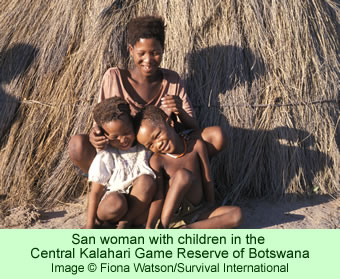When a court appeal by the G/wi for unfettered access to their lands was denied in September, Survival International pledged to mount an international campaign for justice. The government of Botswana has sought to prevent the San people from hunting, from having access to water, and from living on their traditional lands. It hassles people when they try to visit their families.
 The goals of the government in removing the San groups from the path of diamond exploitation in Botswana’s Central Kalahari Game Reserve (CKGR) have led to a recent pattern of confrontations. The San have won several victories in the nation’s courts, but they lost the most recent one because their British lawyer was denied an entry permit by the government.
The goals of the government in removing the San groups from the path of diamond exploitation in Botswana’s Central Kalahari Game Reserve (CKGR) have led to a recent pattern of confrontations. The San have won several victories in the nation’s courts, but they lost the most recent one because their British lawyer was denied an entry permit by the government.
Survival International, an indigenous rights NGO based in London, has been a firm supporter of the San peoples. “Survival will not rest until the tribe’s rights are restored,” the Director of the group, Stephen Corry, said in September after the loss in the nation’s High Court.
SI has mounted an international campaign to boycott travel to Botswana as long as that country continues persecuting the indigenous minority population and denying them justice. At a World Travel Market exhibition in London last week, SI campaigners gained notice from many in the travel industry by handing out leaflets urging people to join the boycott against Botswana. SI is calling for Botswana to grant the San people the right to free access, without hassles, to their historic lands in the CKGR.
The travel boycott is starting to have some effect, since some travel agencies are now supporting the SI appeal. The Annie Bulmer Travel agency in London, along with others, has pledged to not send any additional tourists to Botswana.
“We’re saddened and shocked to hear that Botswana’s bushmen are being chased out of their reserve by the government,” Ms. Bulmer said. “The Botswana tourism board would have tourists believe that the bushmen are one of the country’s greatest assets, but it seems soon there will be no bushmen left. Annie Bulmer Travel will not be sending tourists to Botswana until its indigenous residents are treated with dignity and respect.”
According to another industry source, Botswana was promoting its travel industry at the trade show all week. Next to diamonds, travel is the second largest industry in the country.
Interestingly, a diamond industry editorial last week also criticized the government for its treatment of the San, in light of Survival’s travel boycott and the pamphleteering at the London trade show. Rapaport News acknowledged the history of the industry’s involvement in Botswana, as well as SI’s claims that the government’s evictions and resettlement campaigns against the San peoples were perpetrated in hopes of having unfettered access to the diamond wealth.
Rachel Stenham, from SI, told the industry source that many of the San people are hoping for jobs from the mining development. Neither they nor SI are opposed to the diamond mining. Rather, they are distressed by the government’s unwillingness to accede to the court rulings giving the G/wi unhampered access to their lands and the rights to water and hunting.
While Rapaport News does not take a stand one way or the other on the SI campaign, it does indicate its distress at the obduracy of the government in the face of current developments in Botswana diamond mining. The news story indicates that after 100 years of working out of London, De Beers is about to move its sales operations to Gaborone, the capital of Botswana.
The article in Rapaport News expresses admiration for the positive ways the nation has developed its diamond industry and a complex of related businesses. Overall, despite concerns about ethical diamond production in other parts of the world, “Botswana has a powerful story to tell about its own product.,” the publication editorializes.
It concludes, however, that whether or not the charges by SI are true, the travel boycott will tarnish Botswana as a whole. It opines that the result will be a shame for Botswana, and for its role as a “burgeoning diamond hub.”